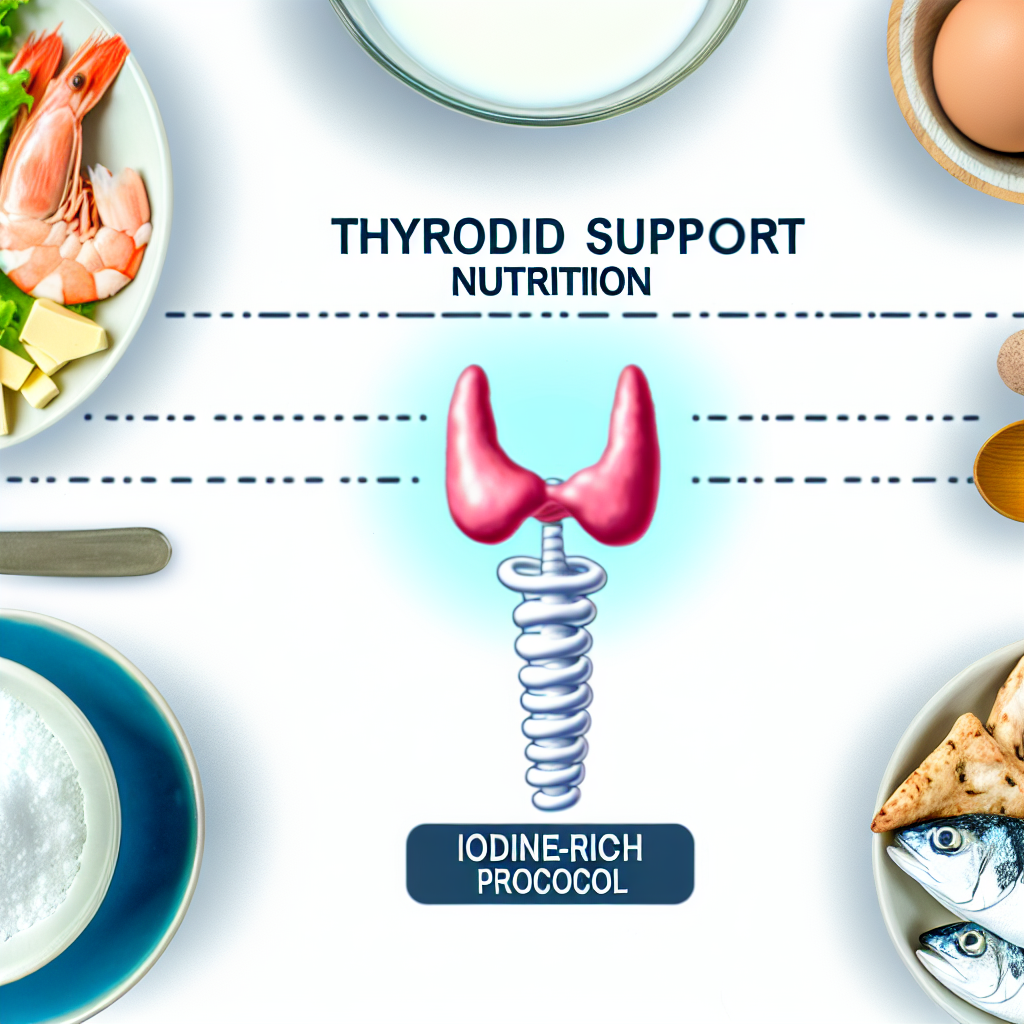Thyroid Support Nutrition – Iodine-Rich Protocol
Introduction
The thyroid gland, a small butterfly-shaped organ located in the neck, plays a crucial role in regulating the body’s metabolism, energy production, hormonal balance, and overall vitality. It synthesizes thyroid hormones—primarily triiodothyronine (T3) and thyroxine (T4)—by utilizing iodine, a trace mineral that is essential yet often overlooked in modern diets.
A deficiency in iodine can lead to a spectrum of thyroid dysfunctions including hypothyroidism, goiter, fatigue, weight gain, cold intolerance, and even depression or cognitive issues. These symptoms can progress silently and are often misdiagnosed, delaying effective nutritional therapy.
With a rising prevalence of thyroid conditions, especially among women, there is growing interest in natural thyroid support including nutritional and herbal options. One of the most effective protocols is an iodine-rich diet that supports hormone synthesis and restores endocrine balance.
Many individuals use processed iodized table salt, which might not provide sufficient or bioavailable iodine. Additionally, endocrine disruptors—found in plastics, pesticides, and skincare—can block iodine absorption, further compromising thyroid health. Vegan diets and some vegetarian practices, although healthful in other respects, may lack adequate natural iodine sources like fish, seaweed, and dairy, thus increasing the risk of deficiency.
Traditional healing systems like Ayurveda and naturopathy embrace the concept of “food as medicine.” By introducing iodine-rich foods, herbal adaptogens, and specific homeopathic remedies, individuals can support thyroid function, boost immunity, sharpen mental clarity, and enhance energy levels naturally.
Whole foods like kelp, nori, sea moss, eggs, Himalayan pink salt, cranberries, and yogurt not only enhance thyroid hormone output but also support immunity and mood regulation.
When paired with herbal allies such as ashwagandha, bladderwrack, and bugleweed—each known for their thyroid-modulating properties—this nutrition-first protocol empowers individuals to manage their health naturally.
Whether managing a diagnosed thyroid disorder or seeking preventive support, integrating an iodine-rich nutrition protocol offers a holistic, evidence-based approach to thyroid health.
Scientific Features and Supporting Medical Studies
The effectiveness of iodine for thyroid health is well-established in both medical and clinical nutrition literature. The thyroid gland requires iodine to create the hormones T3 and T4, regulating metabolic processes throughout the body.
The World Health Organization (WHO) identified iodine deficiency as the leading cause of preventable mental impairment worldwide, directly linking it to thyroid hormone imbalance and developmental disorders. Their report emphasizes that adequate iodine intake is critical for nerve, brain, and thyroid function, especially in pregnancy and early childhood.
A peer-reviewed study published in the Journal of Clinical Endocrinology and Metabolism warns that mild to moderate iodine deficiency persists in developed regions like North America and Europe, even after salt iodization programs. This underscores the need for whole-food-based iodine consumption and better public education.
Research from the Framingham Offspring Study showed a clear link between higher dietary iodine intake and enhanced thyroid function. Participants who consumed more iodine-rich foods like dairy and seafood experienced healthier levels of thyroid hormones and fewer thyroid abnormalities.
Ashwagandha (Withania somnifera), a powerful adaptogenic herb, has been shown to balance TSH, T3, and T4 in patients with subclinical hypothyroidism. A 2018 double-blind, placebo-controlled trial published in the Journal of Alternative and Complementary Medicine demonstrated significant improvements after just eight weeks of 600 mg/day of ashwagandha root.
The seaweed bladderwrack (Fucus vesiculosus) is rich in iodine and other minerals beneficial to thyroid health. Though lacking in robust clinical evidence, bladderwrack has been used traditionally to reduce goiters and support sluggish thyroids.
Homeopathic remedy Thyroidinum 30c, derived from animal thyroid tissue, is used to stimulate thyroid function and improve energy. While more scientific validation is needed, many integrative practitioners report positive outcomes in clients using personalized homeopathic approaches.
These studies support that a combined protocol including nutrition, herbs, and homeopathy can offer a sustainable, natural alternative or complementary strategy for thyroid balance.
Conclusion
Naturally enhancing thyroid health requires a well-rounded approach built upon replenishing vital nutrients—especially iodine. By adopting an iodine-rich nutritional protocol, individuals can restore hormonal balance, boost energy, and address the root causes of thyroid dysfunction.
Modern research validates traditional wisdom in favor of whole-food solutions that provide essential trace elements, such as those found in sea vegetables and dairy. This nutrition-first method becomes even more effective when paired with adaptogenic herbs and individualized homeopathy, creating a synergy that supports long-term wellness.
A holistic thyroid regimen helps support better metabolism, focused thinking, improved energy, and stronger immunity. Those exploring natural thyroid remedies can begin with dietary changes, herbal allies, and homeopathic support tailored to their condition.
Empowering yourself with knowledge and providing the body with what it truly needs is the foundation of optimal health. Supporting thyroid function holistically isn’t just about symptom relief—it’s about cultivating resilience from the inside out.
References
– World Health Organization. Iodine Status Worldwide
– Zimmermann, M. B. (2009). Iodine deficiency in industrialized countries. Journal of Clinical Endocrinology & Metabolism
– Pearce, E. N., et al. (2013). Thyroid function and the use of iodized salt and iodine-rich foods in the Framingham Offspring Study
– Sharma, A. K., et al. (2018). Efficacy and Safety of Ashwagandha Root Extract in Subclinical Hypothyroid Patients
Concise Summary
An iodine-rich nutrition plan is a foundational tool in supporting thyroid health naturally. This article discusses how the thyroid gland relies on iodine for hormone production and how deficiencies can lead to hypothyroidism, fatigue, and weight gain. Emphasizing whole-food sources like seaweed, eggs, and yogurt, the guide incorporates herbal allies such as ashwagandha and bladderwrack along with homeopathic remedies like Thyroidinum. Backed by research including WHO and Framingham studies, this holistic strategy empowers individuals to restore thyroid function, improve hormonal balance, and enhance wellness without pharmaceutical dependency.

Dominic E. is a passionate filmmaker navigating the exciting intersection of art and science. By day, he delves into the complexities of the human body as a full-time medical writer, meticulously translating intricate medical concepts into accessible and engaging narratives. By night, he explores the boundless realm of cinematic storytelling, crafting narratives that evoke emotion and challenge perspectives.
Film Student and Full-time Medical Writer for ContentVendor.com



